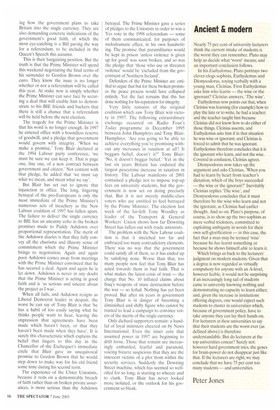Ancient Et modern
Nearly 75 per cent of university lecturers think the current intake of students is the worst they can remember. Plato may help us decide what 'worst' means; and an important conclusion follows.
In his Euthydemus, Plato portrays two clever-clogs sophists, Euthydemus and Dionysodorus, toying verbally with a young man, Cleinias. First Euthydemus asks him who learns — the wise or the ignorant? Cleinias answers, 'The wise'.
Euthydemus now points out that, when Cleinias was learning (for example) how to play the lute or to write, he had a teacher; and the teacher taught him because Cleinias did not know how to do either of those things. Cleinias assents, and Euthydemus asks him if in that situation he was wise or ignorant; and Cleinias is forced to admit that he was ignorant. Euthydemus therefore concludes that it is the ignorant who learn, and not the wise. Covered in confusion, Cleinias agrees.
Dionysodorus now takes up the argument and asks Cleinias, 'When you had to learn by heart from teacher's dictation, which of the boys succeeded — the wise or the ignorant?' Inevitably Cleinias replies 'The wise', and Dionysodorus concludes that it must therefore be the wise who learn and not the ignorant, as Cleinias had earlier thought. And so on. Plato's purpose, of course, is to show up the two sophists as mere verbal tricksters, committed to exploiting ambiguity in words for their own self-glorification — in this case, the fact that a man may be termed 'wise' because he has learnt something or because he shows himself able to learn it.
Which brings us back to the lecturers' judgment on modern students. Given that a degree is now regarded as virtually compulsory for anyone with an A-level, however feeble, it would not be surprising if an increasingly long tail of students came to university knowing nothing and demonstrating no capacity to learn either; and, given the increase in institutions offering degrees, one would expect such students to cluster in universities which, because of government policy, have to take anyone they can lay their hands on. For lecturers at these universities to say that their students are the worst ever (as defined above) is therefore understandable. But do lecturers at the top universities concur? Surely not: however hard government tries, the genes for brain-power do not disappear just like that. If the lecturers are right, we may conclude that we have 75 per cent too many students — and universities.
Peter Jones










































































 Previous page
Previous page